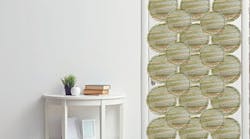Chilean University Students Develop Acoustic Panels That Combat Waste and Privacy
Overcrowding is a serious problem for most cities and Santiago, Chile is no exception. The pandemic has since only aggravated the issue, causing many families to be in the same place together all day long. To help combat the noise, several Chilean university students designed “The Chilensis”, a solution that develops sound isolators using discarded palm leaves to improve the quality of life by providing privacy.
In Chile, there are several types of palm trees, including the Chilean palm tree Jubaea Chilensis and the palm tree Brahea armata, known as the blue palm. Nowadays, the trees’ discarded palm leaves are treated as a waste, according to the students’ project summary. The young design team, comprised of students from Pontifical Catholic University of Chile and University of Santiago de Chile, created a material-driven design strategy that benefits from the natural properties of the leaves, including:
- Low-cost production
- Great sound isolation
- Contamination-free manufacturing
- Biodegradable material
- Low degradation time
The students named the eco-panels “Aíslate”, a word that means “isolate yourself” in Spanish, and also contains the word “Isla”—meaning islands—a geographical place that people associate with palms. Their solution aims to improve people’s quality of life by giving them something fundamental to their well-being: more privacy.
“We intend to be pioneers in the industry, considering that other sound isolators in the market are made of plastic or wood, generating waste that will not degrade in hundreds of years, while our product will take less than a year to degrade in a suitable humid environment,” said the students in their project summary.
The natural acoustic design landed the students third place for Wege Prize, an international student design competition organized by the Kendall College of Art and Design of Ferris State University (KCAD). The students presented their ideas at a live online event as the culmination of a nine-month-long competitive process supported by expert judges.
[Related: Students Create Award-winning Designs With Laminate]
Wege Prize provides a powerful and accessible platform for any college or university student in the world to develop tangible solutions to serious challenges, benefiting from a collaborative process that transcends disciplinary, cultural and institutional boundaries. The resulting solutions—including many that go on to join incubators and earn startup funding—address climate and environmental impacts, social and economic disparities, and cycles of waste, hunger and poverty.
With the $5,000 prize money, the student designers of The Chilensis project hope to utilize specialized equipment that will allow them to significantly improve the quality of the palm panels.
Wege Prize 2022 through 2026 will again be open to any undergraduate or graduate student in the world and will be focused on developing a circular economy. New in 2022, Wege Prize has been extended for five more years of competitions, with a new growth plan to double the prize purse to total $65,000. More details about this year’s winner and the competition can be found at www.wegeprize.org.
Read next: This Desk’s Minimal Design is Big on Social and Environmental Impact

